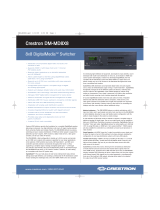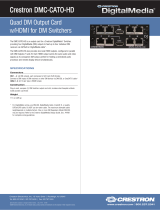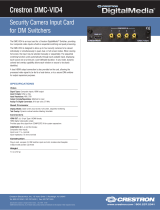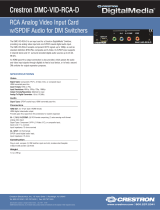Page is loading ...

Input Card Installation (DM-MD8X8-CPU3 Shown)
Output Card Installation (DM-MD8X8-CPU3 Shown)
DMC I/O Series
DigitalMedia™ Input/Output Cards
Installation Guide
Description
DMC I/O (input/output) cards occupy the DM-MD8X8-CPU3, DM-MD16X16-CPU3,
DM-MD32X32-CPU3, and related redundant power supply (RPS) models. The cards
also occupy earlier models of the card-based DigitalMedia™ switchers (DM-MD8X8,
DM-MD16X16, DM-MD32X32, and related RPS models).
Each DMC I/O card occupies a single slot in a DigitalMedia switcher. This document
provides installation instructions for adding or replacing a card.
Adding or Replacing a DMC I/O Card
DMC input cards occupy the leftmost and rightmost slots on the rear of a DigitalMedia
switcher. DMC output cards occupy center slots on the rear of the switcher.
To add or replace a DMC I/O card, perform the following steps and refer to the
illustrations in the righthand column.
1. Do either of the following:
• If adding an I/O card, remove the slot cover of an unused input or output slot as
appropriate by loosening the two thumb screws.
• If replacing an I/O card:
a. Disconnect all cables from the card being replaced.
b. Loosen the two thumb screws that secure the card to the card assembly,
and then slide the card out of the slot.
2. Carefully insert the new card into the left and right guides of the selected slot until
the card is 1/4 inch from the fully seated position.
3. Align the two thumb screws of the card with the corresponding holes in the card
assembly, and then push the card inward until it engages the chassis backplane.
4. Finger-tighten the two thumb screws to secure the card—do not overtighten
the screws.
5. Connect cables to the card.
Additional Resources
Visit the product pages on the Crestron
®
website (www.crestron.com) for additional
information and the latest rmware updates.
Use a QR reader application on your mobile
device to scan the QR image.
NOTE: For instructions to replace one or more cards in a DMCO multicard output
module with a DMC single-slot output card, refer to the DMCO Single-Slot Output Card
Upgrade Package Installation Guide (Doc. 7698) provided with the upgrade package.
(The manual is also available at www.crestron.com/manuals.) To obtain the upgrade
package, contact Crestron True Blue Support at 1-888-CRESTRON (1-888-273-7876).
Thumb screws
Thumb screws
CAUTION: DMC I/O cards are susceptible to damage from electrostatic discharge
(ESD). Standard ESD precautions must be followed when handling the cards.
Always wear an ESD wrist strap that is connected to ground and place the cards on
grounded surfaces only.
NOTE: DMC I/O cards are not hot swappable. Always shut down the DigitalMedia
switcher before adding or replacing cards.
DMC Input Cards
DMC Output Cards

Crestron Electronics, Inc. Installation Guide - DOC. 7692B
15 Volvo Drive, Rockleigh, NJ 07647 (2041631)
Tel: 888.CRESTRON 03.19
Fax: 201.767.7576 Specications subject to
www.crestron.com change without notice.
The DMC Fiber Series are class 1 laser products. They comply with safety regulations of IEC-60825-1,
FDA 21 CFR 1040.11 and FDA 21 CFR 1040.10.
WARNING: Visible and invisible laser radiation when open. Avoid direct exposure to beam.
NOTE: Plug the included dust cap into the optical transceiver when the ber optic cable is unplugged.
The product warranty can be found at www.crestron.com/legal/sales-terms-conditions-warranties.
The specic patents that cover Crestron products are listed at www.crestron.com/legal/patents.
Certain Crestron products contain open source software. For specic information, please visit
www.crestron.com/legal/open-source-software.
Crestron, the Crestron logo, and DigitalMedia are either trademarks or registered trademarks of
Crestron Electronics, Inc. in the United States and/or other countries. UL and the UL logo are either
trademarks or registered trademarks of Underwriters Laboratories, Inc. in the United States and/or
other countries. Other trademarks, registered trademarks, and trade names may be used in this
document to refer to either the entities claiming the marks and names or their products. Crestron
disclaims any proprietary interest in the marks and names of others. Crestron is not responsible for
errors in typography or photography.
©2019 Crestron Electronics, Inc.
Original Instructions: The U.S. English version of this document is the original instructions. All other
languages are a translation of the original instructions.
As of the date of manufacture, the DMC Series cards have been tested and found to comply with
specications for CE marking.
Federal Communications Commission (FCC) Compliance Statement
Th
is device complies with part 15 of the FCC Rules. Operation is subject to the following conditions:
(1) This device may not cause harmful interference and (2) this device must accept any interference
received, including interference that may cause undesired operation.
CAUTION: Changes or modications not expressly approved by the manufacturer responsible for
compliance could void the user’s authority to operate the equipment.
NOTE: This equipment has been tested and found to comply with the limits for a Class A digital device,
pursuant to part 15 of the FCC Rules. These limits are designed to provide reasonable protection
against harmful interference when the equipment is operated in a commercial environment.
This equipment generates, uses, and can radiate radio frequency energy and, if not installed and used
in accordance with the instruction manual, may cause harmful interference to radio communications.
Operation of this equipment in a residential area is likely to cause harmful interference in which case
the user will be required to correct the interference at his own expense.
Industry Canada (IC) Compliance Statement
CAN ICES-3(A)/NMB-3(A)
This product is Listed to applicable UL
®
Standards and requirements tested by Underwriters
Laboratories Inc.
Ce produit est homologué selon les normes et les exigences UL applicables par Underwriters
Laboratories Inc.
/





